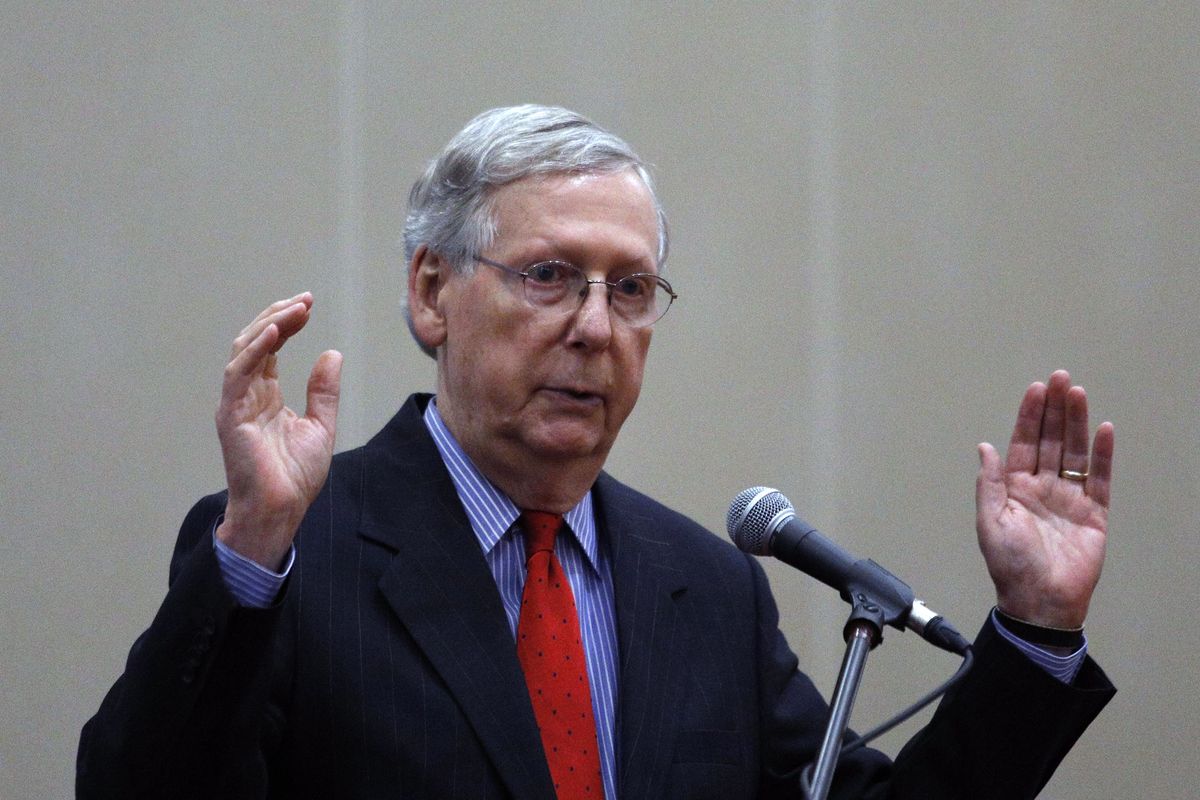Everyone is confused about the health care vote — including Republican senators
/cdn.vox-cdn.com/uploads/chorus_image/image/55810915/643830824.0.jpg)
There’s a sense of consensus among Republican senators: They will be voting on something health care–related next week.
They just don’t know what exactly it will be.
“I don’t even know what we are proceeding to next week,” Sen. Susan Collins (R-ME) said Thursday. “I don’t know whether we are proceeding to the House bill, a new version of the Senate bill, the old version of the Senate bill, the 2015 ‘repeal and hope we come up with something in two years’ bill — I truly don’t.”
After two more senators came out against the Better Care Reconciliation Act — the Senate Republicans’ revised plan to repeal and replace Obamacare — on Monday, for a total of four “no” votes, Congress’s upper chamber has devolved into a state of chaos and confusion. Sen. John McCain is in Arizona, having just received a cancer diagnosis, and without his vote, every form of Obamacare repeal looks more and more uncertain.
As it stands, the BCRA doesn’t look like it has the votes to pass, and there isn’t much finagling with the numbers that could get enough moderates on board without losing senators on the other side of the ideological spectrum. Leadership has reportedly offered a Medicaid option that would put $200 billion toward getting Americans in expansion states onto private insurance, but even that looks uncertain to sway the party’s most moderate faction.
Every Congressional Budget Office score of the Republican plans has projected that tens of millions fewer people would be insured than under the current law. A clean repeal bill is estimated to be the worst in terms of coverage, leaving 32 million fewer people insured.
Nonetheless, Majority Whip Sen. John Cornyn (R-TX) told reporters that there will be a vote on health care next Tuesday, knowing McCain will likely still be unable to vote. As for telling what the vote will be on, “that’s a luxury we don’t have,” Cornyn said.
No one knows what’s going on
/cdn.vox-cdn.com/uploads/chorus_asset/file/8886881/819009728.jpg)
Senate procedure requires Republicans to first vote to proceed to a floor debate on the health bill the House sent over in May. Then Senate Majority Leader Mitch McConnell (R-KY) is able to substitute it with whatever bill he would like to be voted on — a process followed by unlimited amendments.
Earlier this week, McConnell said he would put forward a vote on a clean Obamacare repeal bill first — the same bill Republicans put on then-President Barack Obama’s desk in 2015. But on Wednesday, President Donald Trump called for Republican senators to work toward voting on a replacement plan. Neither option currently has the votes to pass.
So Republican leadership is pushing to get senators to commit to voting in favor of debate, without any clear picture of what they would be debating.
“The statement is we will let you know what comes afterward, and at that point we hope you would agree to a motion to proceed,” Sen. Bill Cassidy (R-LA) said of Republican leaders’ current pitch.
But Collins sounded so resolute in her opposition to the BCRA’s impacts on Medicaid as a whole that even with additional funds, she continued her calls to start from scratch with a bipartisan deal.
“I really think at this point, particularly given the divisions in our conference, that we should go back to normal order [and] have hearings on the problems of the Affordable Care Act, which there are many,” Collins said.
Meanwhile, Sen. Rand Paul (R-KY) has stated that his support is contingent on getting rid of a fund for insurance companies to stabilize the prices between comprehensive plans and skimpier options, calling it “insurance bailout money.” But without that fund, moderates are unlikely to sign on. Paul said he would support moving toward debate only if clean repeal were brought up for a vote first.
Collins, along with Sens. Lisa Murkowski (R-AK) and Shelley Moore Capito (R-WV), said she would not vote to proceed to a clean repeal vote.
There is no consensus on how to move forward — only a sense of urgency to get something done. Republican leadership seems adamant on voting on something, but it’s anybody’s guess on what that something is.
Meanwhile, Trump’s vision is to just get something done
After the BCRA fell apart on Monday morning, Trump, apparently frustrated, told reporters his new plan was to “let Obamacare fail, it will be a lot easier.”
Then he said he was in favor of a clean Obamacare repeal bill.
On Wednesday, he brought all the Republican senators to the White House in a renewed call to negotiate a replace plan.
Trump has repeatedly made it clear he doesn’t have much policy preference on health care whatsoever. During the House debate, Rep. Mark Meadows (R-NC) said Trump needed only two assurances: that premiums would go down and that people with preexisting conditions would be protected. Since, he has been convinced to support bills that do neither of those things.
“The president made very clear at lunch yesterday that he wants to see a bill passed. I’m unclear, having heard the president and read his tweets, exactly which bill he wants to pass, and whether he is for just repealing or repealing and replacing, whether he is for the Senate bill,” Collins said. “There has been a bit of a lack of clarity, but there is no lack of clarity in his determination to have us pass a bill.”
Late Wednesday night, seemingly at the directive of the president, Republican senators met to try to rehash a version of the BCRA that could pass.
But leaving that meeting, Sen. Bob Corker (R-TN) said that at this point, he would rather just move forward with a clean repeal, putting aside Trump’s calls altogether.
Corker called the BCRA is something akin to a “bazaar,” a round of haggling that is unlikely to develop into good policy. His growing concern has pushed him toward wanting to just vote for clean repeal, despite having argued against a repeal-and-delay strategy only six months ago.
Paul has a different idea: a random drawing to decide the order of voting on the BCRA, or a clean repeal bill.
“I think they’re pretty equal in support. Let’s do a random selection; let’s have three or four of them. Put them in random order on the first day, equal billing,” he told reporters. “I think that’s a compromise.”
In other words, with tens of millions of people’s health care on the line, just pull something out of a hat.
[Source:-vox]




